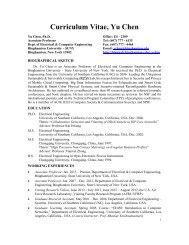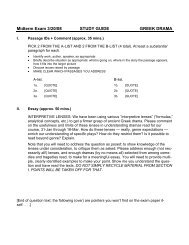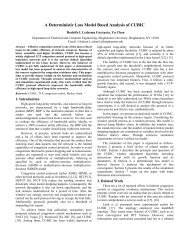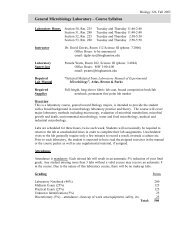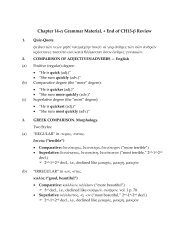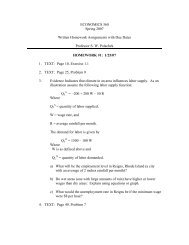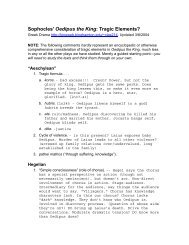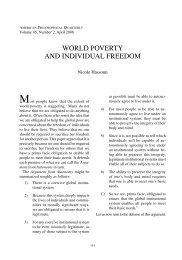Aristotle Poetics - Harvey.binghamton.edu
Aristotle Poetics - Harvey.binghamton.edu
Aristotle Poetics - Harvey.binghamton.edu
You also want an ePaper? Increase the reach of your titles
YUMPU automatically turns print PDFs into web optimized ePapers that Google loves.
<strong>Aristotle</strong> <strong>Poetics</strong> 6<br />
10<br />
a long series of changes that the movement of tragedy stopped on its attaining to its natural<br />
form. 31 (1) The number of actors was first increased to two by Aeschylus, 32 who curtailed<br />
the business of the chorus, 33 and made the dialogue, or spoken portion, take the<br />
leading part in the play. 34 (2) A third actor and scenery were due to Sophocles. (3) Tragedy<br />
acquired also its magnitude. Discarding short stories and a ludicrous diction, through<br />
its passing out of its satyric stage, it assumed, though only at a late point in its progress, a<br />
tone of dignity; and its meter changed then from trochaic to iambic. 35 The reason for their<br />
original use of the trochaic tetrameter was that their poetry was suited to Satyrs and more<br />
connected with dancing than it now is. As soon, however, as a spoken part came in, nature<br />
herself found the appropriate meter. The iambic [ta-DAH], we know, is the most<br />
speakable of meters, as is shown by the fact that we very often fall into it in conversation,<br />
whereas we rarely talk hexameters [DAH-ta-ta], and only when we depart from the<br />
speaking tone of voice. (4) Another change was a plurality of episodes. 36 As for the remaining<br />
matters, the superadded embellishments 37 and the account of their introduction,<br />
these must be taken as said, as it would probably be a long piece of work to go through<br />
the details.<br />
5<br />
As for comedy, it is (as has been observed) an imitation of people worse than the average;<br />
worse, however, not as regards any and every sort of fault, but only as regards one par-<br />
31 See above note.<br />
32 This discussion attributing various innovations to the great names of Athenian<br />
tragedy (Aeschylus, Sophocles, Euripides) has to be treated carefully, as it reflects <strong>Aristotle</strong>’s<br />
teleological approach: “great men” improving tragedy as it evolved into its perfect<br />
form (see note 30). Note too that <strong>Aristotle</strong> means actors, not characters. One actor could<br />
take on multiple roles; a single role could be shared between actors. Mask and costume,<br />
not the person inside, identified the character. Tragedies never needed more than three<br />
actors, however many the roles; Aristophanes introduces a fourth and even fifth actor.<br />
Comedy by Menander’s time (late 300s and later) sticks to the three-actor rule. Note that<br />
everyone involved in producing drama was a man, including the men playing female<br />
characters.<br />
33 “Chorus” (khoros) literally means “dance”; it refers to the dancer-singers of choral<br />
poetry, including dramatic poetry. Athenian drama featured a chorus where sometimes<br />
a “chorus leader” (the koruphaios) spoke for the group, while at other times, the chorus<br />
spoke/sang/danced as a unit. At still other times, choruses seem to have broken into halfchoruses,<br />
and at other times, into separate speakers.<br />
34 Ancient Athenian tragedy and comedy were all in verse, but mixed speaking with<br />
singing with dancing—genuine musical theater.<br />
35 <strong>Aristotle</strong> seems to be saying that the earliest tragedies were the same as, or<br />
closely resembled, yet another type of drama: satyr drama (not satire), i.e., “funny” tragedy<br />
using choruses of satyrs (man-beast creatures). <strong>Aristotle</strong> supposes that at some point,<br />
a more serious type of drama, tragedy, split off from satyr drama.<br />
36 “Episodes” (epeisodoi, “character entries”) are sort of like acts or scenes punctuated<br />
by choral-song “intermezzos” (stasima).<br />
37 Masks, costumes, etc., which <strong>Aristotle</strong> won’t say much about.




